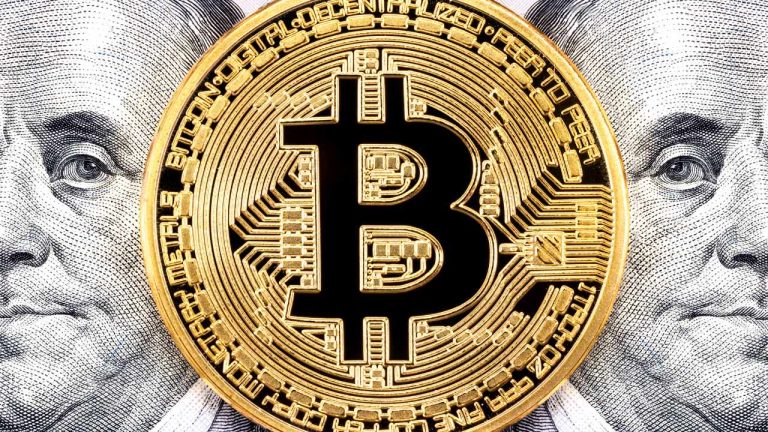 Cryptocurrency exchange Binance posted on social media platform X Thursday that users can purchase cryptocurrency using Mastercard, Visa, or SEPA for bank transfers. The announcement led to confusion among some users regarding the reintroduction of Binance-branded credit cards. Binance Customer Support clarified that the current facilities allow the use of existing payment methods to buy […]
Cryptocurrency exchange Binance posted on social media platform X Thursday that users can purchase cryptocurrency using Mastercard, Visa, or SEPA for bank transfers. The announcement led to confusion among some users regarding the reintroduction of Binance-branded credit cards. Binance Customer Support clarified that the current facilities allow the use of existing payment methods to buy […]
A former investment banker and registered broker has been sentenced for masterminding a $1.5 million crypto fraud scheme. In a new press release, the US Department of Justice (DOJ) says that Rashawn Russell, who used to work for the Financial Industry Regulatory Authority (FINRA), has been sentenced to three years and five months behind bars. […]
The post Ex-Investment Banker and Registered Broker Busted in $1,500,000 Crypto Fraud Scheme: DOJ appeared first on The Daily Hodl.
 U.S. Senator Marsha Blackburn has revealed that there is “so much that appeals” to her about bitcoin. She explained that as we move forward and people are more comfortable with the cryptocurrency, “there will be more transactions in your daily life where bitcoin is accepted as a form of payment.” Senator Blackburn on Benefits of […]
U.S. Senator Marsha Blackburn has revealed that there is “so much that appeals” to her about bitcoin. She explained that as we move forward and people are more comfortable with the cryptocurrency, “there will be more transactions in your daily life where bitcoin is accepted as a form of payment.” Senator Blackburn on Benefits of […]
Americans have burned through a staggering $1.76 trillion in savings since 2020, according to new consumer data. Stats from the Federal Reserve show Americans reached a peak of $2.3 trillion in savings between 2020 and 2021. Today, that number is down to $533 billion, according to new numbers from the U.S. Department of Commerce and […]
The post $1,760,000,000,000 in Americans’ Savings Burned Since 2020 As Credit Card Debt Hits All-Time High appeared first on The Daily Hodl.

In 2022, X1 claimed to have 500,000 people on its waiting list for a credit card. Over the past two years, the startup has raised $62 million from venture capital firms.
Crypto and stock trading app Robinhood has taken a new step to diversify its business portfolio by acquiring the credit card startup X1 in a $95 million deal. The fintech firm offers an income-based credit card with rewards, along with free trial and single-use credit cards.
The deal is expected to be closed by the end of September, Robinhood said in a statement on June 22, adding that the move was “an important step” to a deep relationship with its existing customers.
Robinhood, which already offers debit cards to its customers, gains a new revenue stream with the acquisition. In a press release dated July 18, 2022, X1 reported $50 million in monthly volume and was expecting to reach $1 billion in annualized spend at year’s end.
Announcement incoming We’re acquiring @x1creditcard, a platform that offers a no fee, stainless steel credit card with rewards on every purchase, and an intuitive mobile app experience. This is an important step toward serving all of our customers' financial needs. More info:… pic.twitter.com/VCUjBxkpsM
— Robinhood (@RobinhoodApp) June 22, 2023
According to Robinhood’s latest earnings report, its monthly active users base fell from 16 million in the first quarter of 2022 to just under 12 million over the same period this year. The company also saw a 30% revenue decline year on year for its crypto trading business, with $38 million in crypto trading revenue in Q1 2023, down from $54 million in Q1 2022.
The fintech is Robinhood’s fifth acquisition in four years, according to Crunchbase. In 2019, the company acquired the daily financial newsletter MarketSnacks, followed by three deals in 2021 — the cross-exchange crypto trading platform Cove Markets, the hiring firm Binc and the shareholders’ platform Say. Before the crypto winter broke out, Robinhood acquired the United Kingdom-based crypto asset firm Ziglu in April 2022.
X1’s current valuation is unknown, but the company claimed to have 500,000 people on its waiting list for a credit card in 2022. Since 2020, the startup has raised over $60 million from venture capital firms such as Craft Ventures, Soma Capital and FPV, the venture firm of Google Analytics co-founder Wesley Chan, who is also an investor in Robinhood and financial services company Plaid.
Magazine: Tornado Cash 2.0 — The race to build safe and legal coin mixers
 On April 13, a C6 Bank customer in Brazil shared screenshots of his online bank account, revealing that the financial institution was tracking CO2 emissions from his purchases and urging him to compensate monetarily. C6 Bank states that the new tool aims to inspire Brazilians to adopt more sustainable behaviors. ‘CBDC Preview’ — Bank Customer […]
On April 13, a C6 Bank customer in Brazil shared screenshots of his online bank account, revealing that the financial institution was tracking CO2 emissions from his purchases and urging him to compensate monetarily. C6 Bank states that the new tool aims to inspire Brazilians to adopt more sustainable behaviors. ‘CBDC Preview’ — Bank Customer […]
Stablecoins offer a way for consumers — particularly Americans — to escape the financial industry’s punitive transaction fees.
As rising prices have forced consumers all over the world to reduce their spending and find new ways of coping with the increased cost of living, consumers are finding themselves relying on credit cards even more than they already were.
More Americans are unable to pay their credit card bills in full at the end of the month, with 46% of credit cardholders carrying month-to-month debt, up from 39% in 2022. A recent report from the Federal Reserve Bank of New York highlighted how the current 15% year-to-year credit card balance increase represents the largest jump in more than 20 years.
It’s undeniable that ordinary people are facing higher prices across the board, and are increasingly unable to make credit card payments. That’s because payments giants like PayPal are taking advantage of consumers, and we’ve all been letting them get away with it.
As credit card spending in the United States almost entirely benefits Visa and Mastercard, who handle 80% of total transactions, the failure of the competitive model in the credit card industry may be to blame for at least part of the crisis at hand
Related: Did regulators intentionally cause a run on banks?
But that’s not all: With the highest credit card swipe fees of any major economy, American businesses pay up to seven times more in swipe fees than businesses in Europe, and five times more than businesses in China — a cost that gets passed down directly to consumers. In order to avoid shouldering transaction costs, merchants are forced to set higher prices than they would prefer — that’s prices for all consumers, not just those choosing to pay by credit card — which essentially means that anyone paying by cash or debit card is forced to pay a higher price for the convenience of a select few.
It’s true that electronic payments are convenient, and they’ve solved many of the cross-border problems posed by an old cash-only mentality. However, consumers end up paying a lot more for this comfort than they might have been led to believe, and they might not even know it.
In 2023, the technology at our disposal is so advanced that centralized services imposing limits on merchants’ or customers’ rights to send and spend simply should not exist.
Why, in today’s world, should anyone be forced to use a centralized service that is specifically designed to take such a big cut of their every purchase?
By replacing old systems and traditional payment providers — which serve the greater monopoly rather than hard-working ordinary people — distributed solutions can save consumers and merchants more money. In order to do this in a safe and transparent fashion, however, volatility cannot be a part of the equation, which means traditional cryptocurrencies cannot be the answer. But stablecoins could be.
Give me my goddamn money @paypal. I should have conducted this transaction in bitcoin.
— Neeraj K. Agrawal (@NeerajKA) November 11, 2011
Stablecoins are specifically designed for price continuity, as the name suggests. Their value is directly tied, or pegged, to a “stable” reserve asset, like a precious metal or the U.S. dollar, so their price is ultimately fixed. By allowing for real-time payments over blockchain networks, they offer faster and more efficient money movement than their fiat counterparts. With a more concrete value proposition for everyday use, they represent a more effective alternative to more highly volatile cryptocurrencies.
But with some stablecoins going as far as offering 99% cheaper fees for consumers and merchants compared to what the current global payment solution providers offer, they also represent a good way out of our dependency on credit cards as a whole.
In a 2021 speech, the Federal Reserve Board’s vice chairman for supervision, Randal Quarles, invited us to “not fear stablecoins,” as their potential benefits should be taken into “strong account,” and “the possibility that a U.S. dollar stablecoin might support the role of the dollar in the global economy.” Elsewhere in the world, things are moving in a similar direction. For example, the Digital Euro Association sees “automated micropayments as a way for Europe to maintain its digital competitiveness.”
The solution may be found in stablecoins themselves or in the mix between traditional financial structures and the innovations of Web3, and it could be easier to implement than we might think.
Related: Bank collapses are spurring interest in self-custody startups
Since merchants may be reluctant to build up the necessary crypto knowledge they would need to accept stablecoins, they could instead look to providers who would allow them to both accept stablecoins as a currency, and get settled into bankable fiat currency without the need to change accounting procedures. The stablecoin provider could add value, security and transparency to its proposition by getting the stamp of approval of something like a bank guarantee, in which case the value of the stablecoin in question would be fully protected, and consumers’ peace of mind would be assured.
The important thing to remember is that both merchants and consumers — sick of a system keeping them hostage — are desperate for innovative solutions to a crisis that’s been left unchecked for simply too long. To this end, the mainstream use of stablecoins as a means of payment does have the potential to save us from our dependency on the credit card industry and even drive down gouged consumer prices. Their value proposition shouldn’t be overlooked.
What will it take to implement a cheaper, more efficient and straightforward way to conduct business? Are we resigned to letting ourselves be taken advantage of? If the answer is no, then stablecoins and other low-fee Web3 solutions may be where we need to start.
This article is for general information purposes and is not intended to be and should not be taken as legal or investment advice. The views, thoughts and opinions expressed here are the author’s alone and do not necessarily reflect or represent the views and opinions of Cointelegraph

The new debit card builds on technology already in place in the existing Bit2Me crypto card, but this time, card holders are eligible for up to 9% crypto cashback.
The merger of Web2 and Web3 tools continues as crypto-backed debit cards become more mainstream.
In an announcement on Feb. 10, Bit2Me, the largest Spanish cryptocurrency exchange, revealed its new cashback debit card in partnership with Mastercard.
The original Bit2Me card works for its users via the Mastercard network that hosts millions of businesses worldwide. This new update offers users up to 9% crypto cashback for all purchases made with the card online or in-store.
Leif Ferreira, the CEO and co-founder of Bit2Me, told Cointelegraph that the use of already known Web2 financial tools like debit and credit cards comes with the hope of greater adoption of this "revolutionary" technology
"[The] goal is that any user from anywhere in the world has easy access to the limitless world of Web3 financial services, at the touch of a button."
The card and wallet support eight cryptocurrencies, including Bitcoin (BTC), Ethereum (ETH), Cardano (ADA), Ripple (XRP), Solana (SOL) and Polkadot (DOT), along with the stablecoin Tether (USDT).
The company reportedly plans to add additional currencies throughout the year. Bit2Me is currently available to users in 69 countries around the world. However, users in the European Economic Area (EEA) are only eligible to apply for the virtual version of the card.
Related: The state of crypto in Southern Europe: Malta leads the way
Bit2Me has had service expansion on its radar for some time, after its initial announcement in 2021 to offer services globally. Back in July, the exchange was quick to jump to help 100,000 blocked crypto investors onboard onto its platform after they wereshut out from the defunct local Spanish trading platform 2gether.
Meanwhile, Mastercard has also been active in offering new services and opportunities for users and clients in the Web3 space. It has chosen at least seven blockchain and crypto startups to be a part of its fintech accelerator program in the last year.
The company also partnered with Polygon to launch a Web3 musician accelerator program, focusing on the intersection of the music industry and emerging technologies.
On Jan. 31, Mastercard announced a new effort with Binance to launch their second prepaid crypto card in Latin America.

As decentralized finance continues to become more mainstream, traditional financial tools can serve as a bridge from Web2 to Web3 for those who still remain skeptical.
Last year proved that the Web3 space is not just a phenomenon but rather the future of digital interactions. However, as pervasive as the space has become, many are still skeptical as to how it can and will be a part of their lives.
Many developers are seeking ways to bridge the gap between these two iterations of the web. Cointelegraph spoke with Bruno Guez, the CEO of Revelator, to understand why he believes already existing Web2 financial tools like credit cards can actually be bridges to usher new users into Web3.
Revelator, which works in the music industry that provides labels and distributors the infrastructure to run their businesses, recently announced that it integrated Stripe to help fans seamlessly purchase digital collectibles with their credit cards.
Guez said that making these new digital tools accessible via Web2 tools users are already familiar with, such as credit cards, creates a bridge between these two versions of the digital reality.
“The majority of the developed world uses credit cards for everyday purchases. If we want to usher new users onto Web3, we must provide these web2 users with a familiar and “safe” payment method.”
However, he touched on how using familiar Web2 financial tools helps lessen the hurdles plaguing the industry, such as a lack of education on decentralized money management.
“If we make the onramp easier and make accessing Web3 assets easier, we can slowly educate them about the power of decentralization, and all that entails.”
He continued to say that this further education includes informing users about self-custody practices so that they can “fully embrace Web3, operate their digital wallets, and never lose access to their digital assets.”
The lack of knowledge has created barriers to self-custody, which have often made centralized exchanges popular due to ease of access and user experience. Though, as Guez pointed out, and as has recently been seen in cases like FTX, when the centralized exchanges go out of business, customer trust and confidence in the industry as a whole is damaged.
Related: ‘Wall of worry’ led to digital wallets, blockchain tech ignored: Cathie Wood
Revelator isn’t an anomaly in the Web3 space for utilizing credit cards to help onboard new users. Many other businesses are seeing how to continue pushing mass adoption by working with tools. At the beginning of 2022, Stripe announced partnerships with FTX, FTX US, Blockchain.com, Nifty Gateway and Just Mining to launch a crypto business suite.
In 2022 it also partnered with Twitter to offer USDC payments to content creators on the platform, along with integration on a Solana-based market maker to offer a fiat-to-crypto onramp.
Guez said that credit cards efficiently on-ramp users onto Web3, while smart wallets are already operating in the background. This enables a “clean way” to perform blockchain transactions without the users needing prior blockchain knowledge.
“In this way Web2 and Web3 tools work together; by abstracting the complexity away from the user experience.”
According to reports which surfaced on Jan 26., Stripe is working with JP Morgan professionals to advise toward a potential public offering after its fruitful reemergence onto the crypto scene.

Visa began working on a blockchain interoperability project in Sept. 2021 to support CBDC and stablecoin adoption but few updates have been made since.
The chief executive of credit card giant Visa remains confident that blockchain-powered solutions can be integrated into its services and offerings to power the next generation of payments.
Speaking on a call at Visa’s annual stockholder meeting on Jan. 24, outgoing CEO Al Kelly — who will officially step down on Feb. 1 — briefly shared the firm’s plans for Central Bank Digital Currencies (CBDCs) and private stablecoins.
According to a Jan. 24 report from San Francisco Business Times, Kelly said:
“It’s very early days, but we continue to believe that stablecoins and Central Bank Digital Currencies have the potential to play a meaningful role in the payments space, and we have a number of initiatives underway.”
“We’ve had an immaterial amount of investments in crypto funds and companies as we seek to invest in the payments ecosystem,” the outgoing CEO explained.
Kelly also confirmed that Visa’s balance sheet hasn’t been impacted by some of the “high-profile failures” that rocked the cryptocurrency space in 2022:
“We’ve had no credit losses related to these failures [...] In everything we do, please know that we’re extremely focused on maintaining the integrity of Visa’s payment system and the payment system in totality and of course, the reputation of our brand standing for trust.”
Over the years, Visa has worked on a number of crypto-related initiatives.
Its research team began working on a blockchain interoperability project in September 2021, named the Universal Payment Channel (UPC) initiative, the project was designed to establish a “network of networks” for CBDCs and private stablecoins to pass through various payment channels.
Visa hasn’t provided an update on the UPC in over 12 months, however.
More recently, the payment giant announced on Dec. 20, 2022, that it was chalking up a plan to allow automated bills to be paid out from a user’s Ethereum-powered wallet.
Visa has also rolled out several “zero fee” cryptocurrency debit cards of late including a now-terminated agreement with FTX and a partnership with Blockchain.com on Oct. 26, 2022, which is still in effect.

While Visa’s 2022 annual report only included data up until Sept. 30 — about five weeks before FTX collapsed — more information may be revealed in Visa’s Q1 2023 earnings call on Jan. 26.
Related: Bitcoin Lightning Network vs Visa and Mastercard: How do they stack up?
Visa President Ryan McInerney will officially replace Al Kelly as CEO on Feb. 1, while Kelly will remain on board as executive chairman.
McInerney appears to be equally, if not more bullish on blockchain-powered payment solutions too.
In an interview with Fortune in November 2022, McInerney said Visa still has “$14 trillion of cash out there being spent by consumers that can be digitized” and that they’re continuing to explore where crypto payments may be best leveraged.